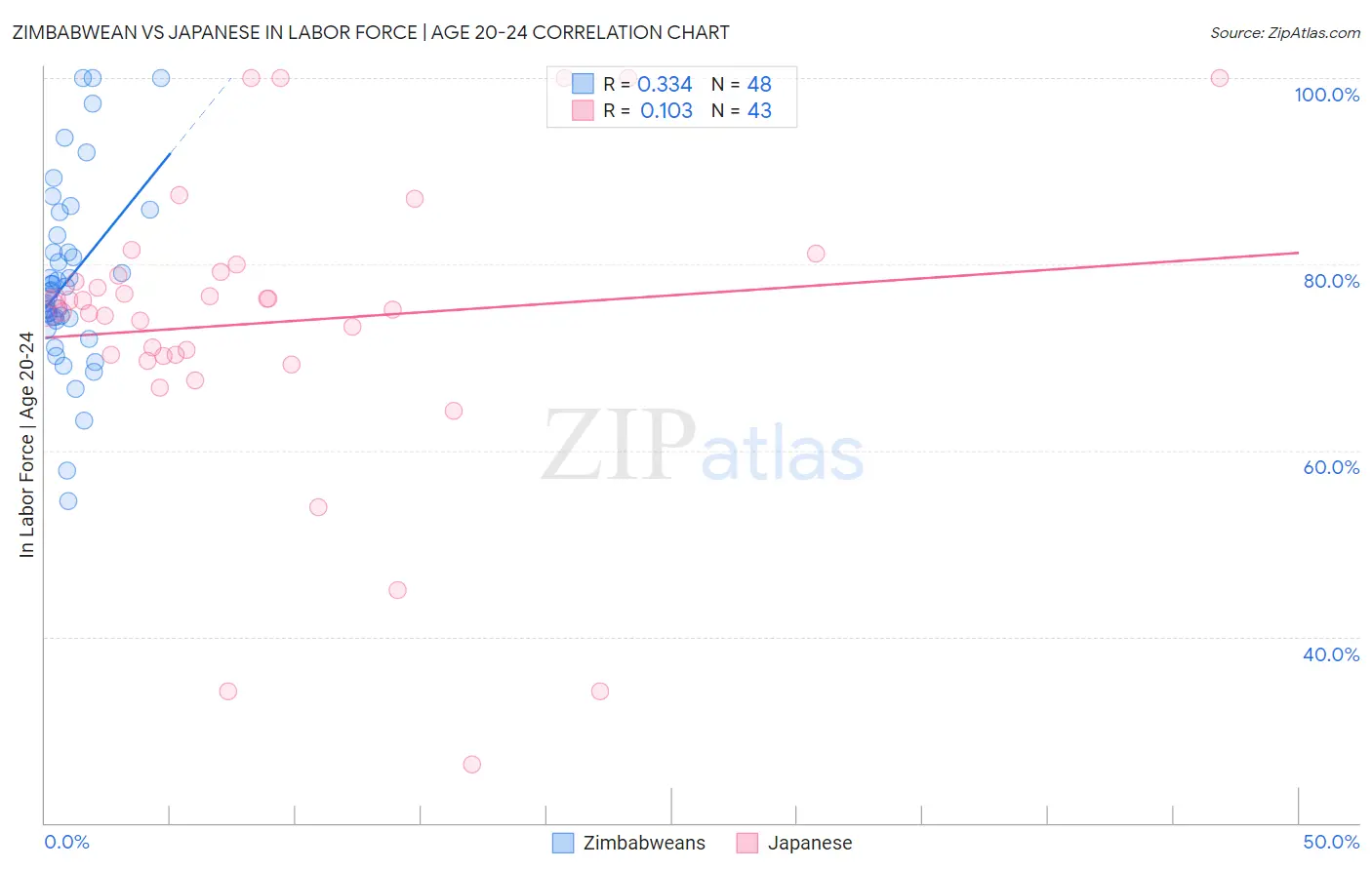Zimbabwean vs Japanese In Labor Force | Age 20-24
COMPARE
Zimbabwean
Japanese
In Labor Force | Age 20-24
In Labor Force | Age 20-24 Comparison
Zimbabweans
Japanese
75.6%
IN LABOR FORCE | AGE 20-24
88.2/ 100
METRIC RATING
133rd/ 347
METRIC RANK
75.3%
IN LABOR FORCE | AGE 20-24
68.7/ 100
METRIC RATING
160th/ 347
METRIC RANK
Zimbabwean vs Japanese In Labor Force | Age 20-24 Correlation Chart
The statistical analysis conducted on geographies consisting of 69,190,987 people shows a mild positive correlation between the proportion of Zimbabweans and labor force participation rate among population between the ages 20 and 24 in the United States with a correlation coefficient (R) of 0.334 and weighted average of 75.6%. Similarly, the statistical analysis conducted on geographies consisting of 249,162,424 people shows a poor positive correlation between the proportion of Japanese and labor force participation rate among population between the ages 20 and 24 in the United States with a correlation coefficient (R) of 0.103 and weighted average of 75.3%, a difference of 0.45%.

In Labor Force | Age 20-24 Correlation Summary
| Measurement | Zimbabwean | Japanese |
| Minimum | 54.6% | 26.3% |
| Maximum | 100.0% | 100.0% |
| Range | 45.4% | 73.7% |
| Mean | 78.3% | 73.7% |
| Median | 77.2% | 75.3% |
| Interquartile 25% (IQ1) | 74.1% | 70.1% |
| Interquartile 75% (IQ3) | 82.2% | 79.2% |
| Interquartile Range (IQR) | 8.1% | 9.1% |
| Standard Deviation (Sample) | 9.8% | 16.2% |
| Standard Deviation (Population) | 9.7% | 16.0% |
Similar Demographics by In Labor Force | Age 20-24
Demographics Similar to Zimbabweans by In Labor Force | Age 20-24
In terms of in labor force | age 20-24, the demographic groups most similar to Zimbabweans are Immigrants from Jordan (75.6%, a difference of 0.010%), Palestinian (75.6%, a difference of 0.010%), Immigrants from Austria (75.6%, a difference of 0.020%), Iroquois (75.6%, a difference of 0.030%), and Immigrants from Afghanistan (75.6%, a difference of 0.040%).
| Demographics | Rating | Rank | In Labor Force | Age 20-24 |
| Brazilians | 93.0 /100 | #126 | Exceptional 75.8% |
| Sub-Saharan Africans | 90.9 /100 | #127 | Exceptional 75.7% |
| Immigrants | Afghanistan | 89.4 /100 | #128 | Excellent 75.6% |
| Iroquois | 89.1 /100 | #129 | Excellent 75.6% |
| Immigrants | Austria | 88.8 /100 | #130 | Excellent 75.6% |
| Immigrants | Jordan | 88.5 /100 | #131 | Excellent 75.6% |
| Palestinians | 88.4 /100 | #132 | Excellent 75.6% |
| Zimbabweans | 88.2 /100 | #133 | Excellent 75.6% |
| Estonians | 87.1 /100 | #134 | Excellent 75.6% |
| Yaqui | 85.5 /100 | #135 | Excellent 75.5% |
| Immigrants | Brazil | 84.8 /100 | #136 | Excellent 75.5% |
| Jordanians | 84.8 /100 | #137 | Excellent 75.5% |
| Australians | 84.8 /100 | #138 | Excellent 75.5% |
| Immigrants | England | 84.6 /100 | #139 | Excellent 75.5% |
| Delaware | 84.5 /100 | #140 | Excellent 75.5% |
Demographics Similar to Japanese by In Labor Force | Age 20-24
In terms of in labor force | age 20-24, the demographic groups most similar to Japanese are South American Indian (75.3%, a difference of 0.010%), Immigrants from Bolivia (75.3%, a difference of 0.040%), Immigrants from El Salvador (75.3%, a difference of 0.050%), Immigrants from Western Europe (75.3%, a difference of 0.050%), and New Zealander (75.2%, a difference of 0.050%).
| Demographics | Rating | Rank | In Labor Force | Age 20-24 |
| Guatemalans | 72.3 /100 | #153 | Good 75.3% |
| Osage | 72.3 /100 | #154 | Good 75.3% |
| Immigrants | Guatemala | 71.9 /100 | #155 | Good 75.3% |
| Immigrants | El Salvador | 71.7 /100 | #156 | Good 75.3% |
| Immigrants | Western Europe | 71.5 /100 | #157 | Good 75.3% |
| Immigrants | Bolivia | 71.0 /100 | #158 | Good 75.3% |
| South American Indians | 69.0 /100 | #159 | Good 75.3% |
| Japanese | 68.7 /100 | #160 | Good 75.3% |
| New Zealanders | 65.4 /100 | #161 | Good 75.2% |
| Immigrants | Romania | 64.6 /100 | #162 | Good 75.2% |
| Costa Ricans | 64.2 /100 | #163 | Good 75.2% |
| Bolivians | 64.0 /100 | #164 | Good 75.2% |
| Afghans | 63.5 /100 | #165 | Good 75.2% |
| Cambodians | 60.5 /100 | #166 | Good 75.2% |
| Immigrants | South Eastern Asia | 57.5 /100 | #167 | Average 75.1% |